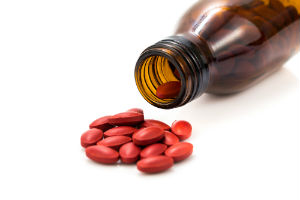What is Vitamin B12? |  |
| Posted: 03 Dec 2014 07:00 AM PST  Vitamin B12, also known as cobalamin, is an essential nutrient and water-soluble vitamin that is a member of the B-complex vitamins. B12 is the largest and most structurally complex of all known vitamins. There are several forms of vitamin B12, all of which are termed ‘cobalamins’ because they contain the trace mineral cobalt in their nucleus structure. Interestingly, this gives the vitamin a reddish color.
Some forms are not bioavailable to the body and must be converted enzymatically for immediate use, while methylcobalamin and hydroxocobalamin (5-deoxyadenosylcobalamin) forms are highly bioavailable. As an essential nutrient, the body cannot make vitamin B12 so it must be consumed via diet or supplementation. Vitamin B12 is found mostly in foods of animal origin such as meat/fish/eggs/organ meats. Fortified foods and supplements are also common sources of the nutrient. Neither plants, animals, or fungi are capable of producing vitamin B12; only bacteria and archaea can synthesize the vitamin. Animals integrate B12 into their tissues via bacterial symbiosis, which is why animal foods are naturally the richest source of B12. Why You Need Vitamin B12Vitamin B12 is important in the following functions:
How Much Vitamin B12 Do You Need Per Day?The IOM (Institute of Medicine) and the FNB (Food and Nutrition Board), the premiere scientific health bodies officially sanctioned by the U.S. government on matters of nutrient intake recommendations, set daily recommendations of vitamin B12 for normal adults at 2.4 mcg/day, with up to 3 mcg/day for pregnant and lactating women. [1] Research suggests that average vitamin B12 intake among the U.S. population is ~3.4 mcg/day, clearly above the adequate recommended daily intake. [2] Due to a host of digestion and absorption issues, disease status, and prescription medication interference, some data suggests up to 15% of the population is B12 deficient. Interestingly, the body can only absorb up to 1.5 mcg of vitamin B12 from food, though supplementation (e.g., sublingual form) has been shown to allow for higher absorption rates by bypassing normal digestion. Humans store between 2 to 5 mg of vitamin B12 (mostly in the liver), which can last up to five years in the absence of daily intake. [3] Though don’t chance it. How To Know If You Are Vitamin B12 Sufficient or DeficientDespite healthy eating and nutritional planning to ensure adequate vitamin B12 intake on a daily basis, as aforementioned, physiological (genetics, disease) and environmental (medications for diabetes, etc.) factors can interfere with normal B12 absorption and metabolism for many people, leading to depletion or outright deficiency. Blood level testing is the surest diagnostic method–in conjunction with potential accompanying symptoms–to assess if you are B12 deficient. Here is a general guideline to follow to determine whether or not you are vitamin B12 deficient:
Depending on test results and potential concurrent symptoms, other simple follow-up blood tests which indirectly test for B12 status may be suggested, including homocysteine and methylmalonic acid/MMA (levels of these molecules rise when vitamin B12 deficiency-symptoms unfold, testing of which often allows for a more thorough assessment, in conjunction with B12 testing). Symptoms of Vitamin B12 DeficiencyBelow are just some of the overt symptoms of low levels and deficiency of this crucial vitamin.
Bottom LineConsidering all of the above information on vitamin B12 and its importance in every human being’s life for optimal health and brain function, the simplest and least expensive insurance against vitamin B12 deficiency is daily supplementation with an absorbable form of B12 (sublingual tablet or lozenge), such as methylcobalamin or hydroxocobalamin. References:
-Dr. Edward F. Group III, DC, ND, DACBN, DCBCN, DABFM The post What is Vitamin B12? appeared first on Dr. Group's Natural Health & Organic Living Blog. |
| You are subscribed to email updates from Dr. Group's Healthy Living blog To stop receiving these emails, you may unsubscribe now. | Email delivery powered by Google |
| Google Inc., 1600 Amphitheatre Parkway, Mountain View, CA 94043, United States | |
No comments:
Post a Comment